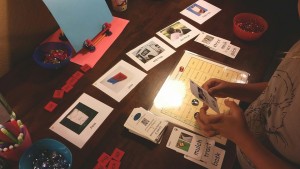
Every month,
Learning Ally celebrates one of our wonderful tutors from our
Tutor Network. This month, we caught up with
Rachel Herman, the
Director of Learning for All: Educational Therapy for Academic Success. Rachel is certified in
Barton Reading and Spelling at the advanced level, and she also specializes in dyslexia and 2e (twice exceptional) children.
Hello Rachel. Thank you so much for all you do for children! How long have you been doing this?
I have over 20 years of professional experience in education, teaching classes in many subjects from primary school through college level, including 6 years of teaching at Point Loma Nazarene University. I also have 13 years of experience home schooling my three children, including a son with dyslexia and ADHD. I began working with students who struggle with processing disabilities in 2003 and founded Learning for All in 2014.
Why did you decide to go into this field?
I did not originally set out to work with students struggling with dyslexia, but my career took an unexpected turn. I was happily teaching college level humanities and homeschooling my three children, when my otherwise bright middle son began to really struggle academically. Admittedly, he had had "quirks" from a very young age, and looking back with the knowledge I now have, the warning signs of a processing disability were evident beginning in PreK; and yet, like so many of the parents I now work with, I was told to just be patient, don't overreact, he will "outgrow" this, he just isn't motivated, etc.
In second grade, he was tested for GATE and scored a 99.9% on the Raven. Not only was he bright, he was "very" bright, and I was told I should just stop worrying. For the next two years, he did show some growth in his language processing skills, and his oral language skills were always exceptional, but his progress in written language acquisition and expression was painfully slow and with each month he fell further and further behind. I finally had him tested through the school district and he did qualify for an IEP under the heading of Specific Learning Disability.
This began three years of services in Speech, OT, and with school Resources Specialist, none of whom were trained in identifying or remediating dyslexia. We tried many programs but nothing seemed to help him. He was frustrated and demoralized and none of us could understand why he could not retain what he was being taught or why it all seemed so much harder for him.

It was a friend who first mentioned the word "dyslexia" to me and suggested my son might fit that profile. I began researching dyslexia extensively and found that my son had about 90% of the warning signs. That began my journey of learning everything I could about dyslexia and learning how to help him. Within a few months of starting
Barton Reading and Spelling, an Orton-Gillingham based protocol written specifically for dyslexia remediation, the improvement in his language skills was dramatic and though there was still a long journey ahead, we knew we were on the right track.
Today he is a happy, healthy high school student, a student body president with a 3.8 GPA. He still has to work extremely hard academically, but his greatest success is that he recognizes the gifts that are associated with his dyslexia, and he knows how to advocate for himself in the classroom.
He is the reason I began working in this field and I have made it my profession so that I can help more students like him gain confidence and experience success in the classroom and beyond.
What is the most rewarding aspect of your career?
There are many rewarding aspects. I love working with other teachers and professionals and doing dyslexia simulations for in-services. I love seeing the light-bulb of recognition and compassion come on, much like it did for me. I love being able to tell parents that, yes, we can help their child. But most of all, I love seeing students who have given up on themselves realize that they are not struggling because they are "slow" or "stupid," but because they have never been taught to read, write, and spell in the ways their unique brains learn.
The right approach changes everything. Tutoring is hard work and sometimes extrinsic motivation (and lots of dedication) is necessary to keep a student on task, but when the student sees the value in the process and the improvement in their skills and their confidence grows, that is what makes it all worthwhile.
What advice can you offer a parent who is concerned about his/her child's reading ability?
As a parent of a student with learning challenges and also a professional in the field, I feel like I have a unique perspective. If you have concerns, particularly if your child's academic skills do not match his cognitive abilities, don't wait to get help.
Processing challenges do not resolve themselves in time.
Your child may be among the 1-in-5 bright and capable students who struggle academically and will continue to struggle without the type of instruction that addresses their need for a systematic, explicit, integrated, multi-sensory approach. Once a student begins to fail repeatedly in the classroom, there is more at stake than just academics.
I also want all parents and students to know that while there are challenges associated with dyslexia and related processing disabilities, there are also many gifts. I always tell my students, I can teach them to read and spell, to write and do math, but the things at which their unique brains are exceptional - skills such as athletics, spatial reasoning, artistic vision, global processing, etc. - cannot be taught. They are gifts and they are gifts of brains that process information in a different way. For more on the advantages of neurodiversity, I highly recommend
The Dyslexic Advantage: Unlocking the Hidden Potential of the Dyslexic Brain by Brock and Fernette Eide.
How do you use Learning Ally's services in your practice?
We start all of our students 2nd grade and above on
Learning Ally as a regular part of our program.
We want our students to work with audiobooks for at least 20 mins/day. If the student can follow along visually, great, but if not it is fine to just listen at first, or follow along for a bit and then just listen if they get tired.
There are 4 goals: 1) to model proper reading (phrasing, prosody, fluency), 2) to give students access to written material that they are intellectually ready for but is beyond their reading level, 3) to begin to mitigate the ingrained habit of guessing at words and 4) to reduce anxiety and resistance to reading by making it easy and fun.
We have had great success using Learning Ally alongside our other programs, such as Barton Reading and Spelling, and many of our students would not pick up a book until they started tutoring and they became voracious readers, thanks to Learning Ally.
Is there anything you would like to add?
I'm very passionate about educating parents and professionals, and I actually travel around the country giving presentations on dyslexia and providing inservices for schools. If you are interested in booking me for a speaking or training engagement, please contact me at
rachel@learningforallsd.com